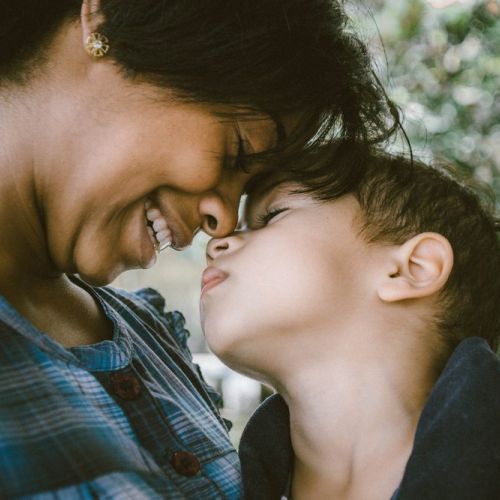Natalie’s bowel cancer story: Why early detection saves lives
By Emily Usher | 27 May 2025

Natalie with her daughter, Zoe, after her bowel cancer diagnosis.
At the time, Natalie was a fit, healthy biochemist and first-time mum. Like many new parents, she was running on empty; grappling with sleepless nights, headaches, and constant fatigue. But something didn’t feel quite right.
“I just kept pushing through. As a mum, you do whatever you can for your children, no matter how tired you are,” she recalls. “But after a few months, I knew something wasn’t right.”
Recognising the early signs of bowel cancer
Natalie’s overwhelming tiredness and disrupted sleep were easily dismissed as typical post-pregnancy side effects. But it was a seemingly minor comment from her dentist who noticed her unusually pale gums (a possible sign of anaemia) that triggered a series of investigations.
Blood tests confirmed low iron levels, and Natalie began iron infusions. Yet something still didn’t feel right. It wasn’t until she underwent a colonoscopy that doctors discovered the real cause: a 5 cm tumour in her bowel.
A devastating bowel cancer diagnosis

Natalie after her bowel cancer surgery. Image: Supplied
“When I first heard the word ‘cancer’, I was oddly relieved. I finally had an explanation,” Natalie says. “But then the reality sunk in.”
With her daughter Zoe just 18 months old, Natalie faced the terrifying prospect of missing out on her life. Doctors couldn’t yet tell how advanced the cancer was, but warned Natalie that if it was stage four, the five-year survival rate was just 13%.
“My partner was facing the prospect of having to raise our daughter by himself,” she says. “I thought, okay, what do I do? How do I fight this? How do I give my daughter the most time with her mum?”
Treatment for stage 2 bowel cancer

Natalie with her daughter Zoe, who is visiting her in hospital. Image: Supplied
Thankfully, Natalie’s cancer was diagnosed as stage two, which significantly improved her outlook. It hadn’t spread to her lymph nodes or liver, so chemotherapy wasn’t needed. Surgery was successful, but recovery was tough.
“I couldn’t lift my daughter for eight weeks following surgery, which meant no hugs,” she says. “As a mum, that is pretty hard.”
It wasn’t just the physical toll that hit hard. “I wanted to put on a brave face for my daughter, and that got me through for about five years,” Natalie says. “But I realised I hadn’t properly processed the emotions associated with my diagnosis.”
The importance of mental health support
Natalie is now a passionate advocate for integrating mental health care into cancer treatment and survivorship. “It’s not just about surviving. It’s about learning how to live after cancer,” she says.
Years later, she still experiences moments of vulnerability. But she believes those moments are worth sharing, especially if it helps others feel less alone.
Bowel cancer and family risk
Natalie’s diagnosis was even more confronting given her family history. Her grandfather had bowel cancer, and in 2020, her mother was also diagnosed.
She underwent genetic counselling and was tested for Lynch syndrome (an inherited condition that significantly increases the risk of bowel and other cancers at a younger age). Although her results were negative, she now undergoes annual colonoscopies as a precaution.
Researching bowel cancer risk: Microbiome, genetics and polyps

Image: Monash University
As a biochemist at Monash University, Natalie turned to science, both to cope with her diagnosis and to contribute to change.
She enrolled in a clinical trial using circulating tumour DNA (ctDNA) to detect early signs of recurrence. Now, she’s working alongside Cure Cancer researcher Dr Peter Georgeson in the Colorectal Oncogenomics Lab at the University of Melbourne.

Cure Cancer-funded resaercher Dr Peter Georgeson.
Together, they’re investigating why bowel cancer runs in families even when genetic links, like Lynch syndrome, aren’t present. One promising avenue is the gut microbiome and its potential role in triggering cancer.
“I’ve come across so many other young mums, particularly women around 40, who haven’t been so lucky,” Natalie says. “Their children are growing up without their mums, and it’s not fair. If we can help women trust their instincts and act early, maybe we can stop that from happening.”
The research Natalie supports is focused on understanding how small, pre-cancerous bowel polyps develop into aggressive cancers. By combining genetic, microbial and lifestyle data, the team hopes to identify who is most at risk, and why.
This could lead to more personalised screening and surveillance, catching cancer earlier when it’s most treatable.
“As a researcher, I really believe that science can help patients,” she says. “It’s about finding better ways to live past cancer.”
Why bowel cancer awareness matters for young people

Natalie and her daughter's first snuggle after surgery.
1 in 9 people diagnosed with bowel cancer are under the age of 50. For Natalie, part of “living past cancer” means breaking the stigma and silence around bowel cancer in younger people, especially women.
“The signs are often easy to dismiss, particularly during or after pregnancy,” she says. “But if something doesn’t feel right, speak up. Keep pushing until someone listens.”
She’s honest with her daughter Zoe about what she’s been through and the importance of normalising cancer screenings.
“I want cancer screening to be something completely normal for her,” Natalie says. “It doesn’t have to be scary, just something we do, like going to the dentist.”
Support the research that gave Natalie hope
Natalie’s story is one of science, survival, and strength. But not everyone is as lucky.
This tax time, your donation can help researchers like Dr Peter Georgeson improve early detection, drive new treatments, and ultimately, save lives.
Together, we can make sure more people survive cancer and go on to live long, full lives with the people they love.
Donate today and help change what a bowel cancer diagnosis means for future generations.










